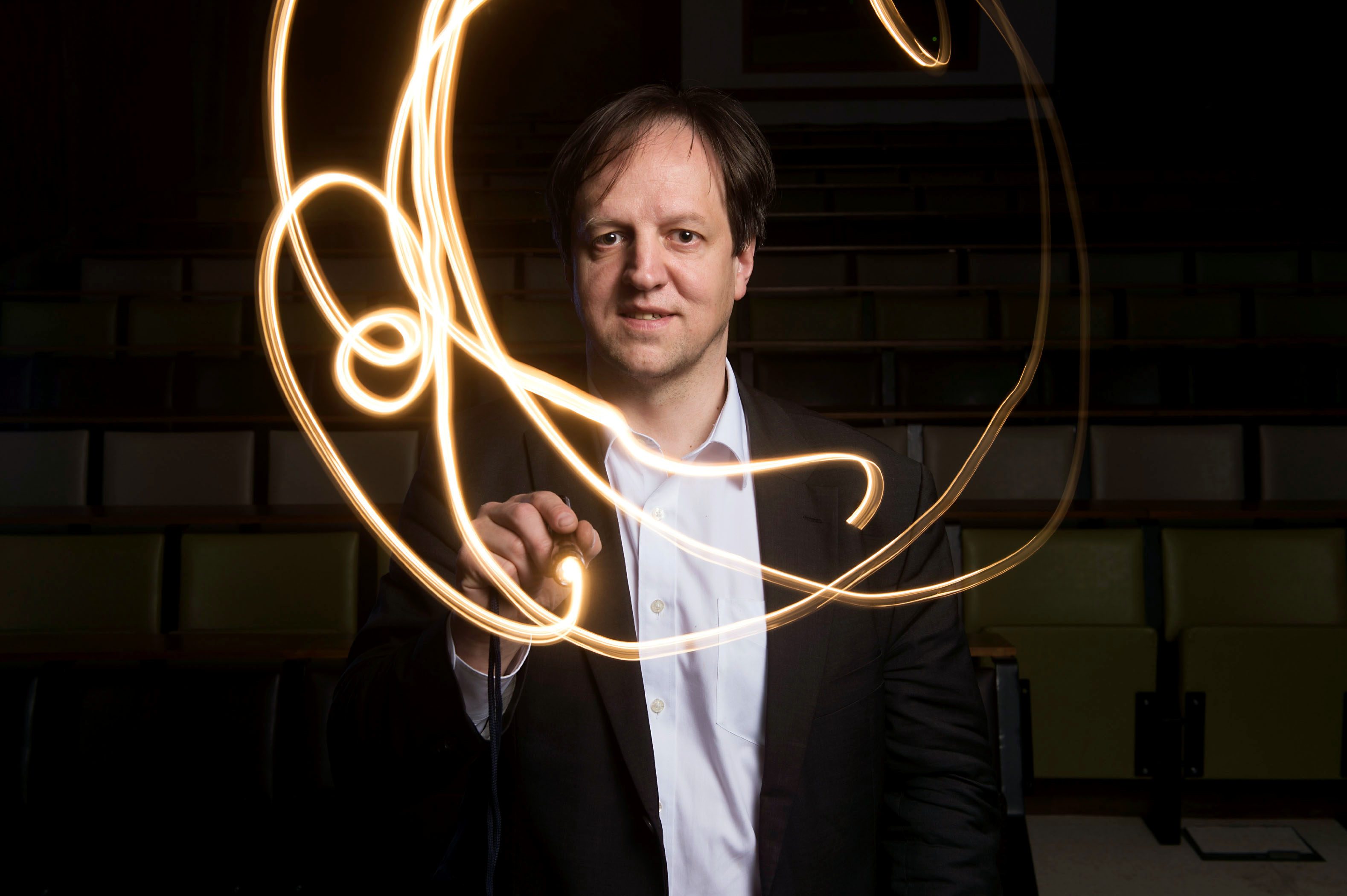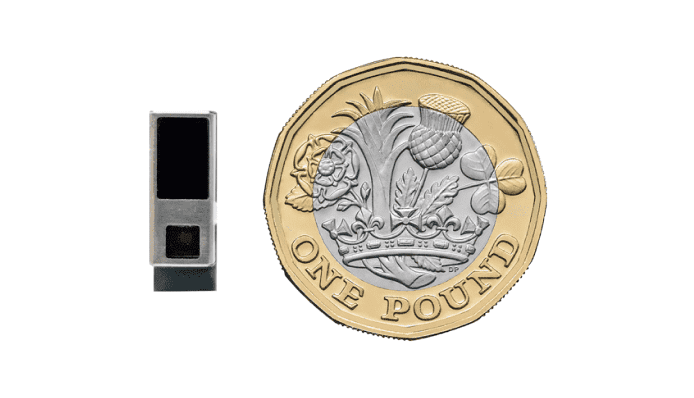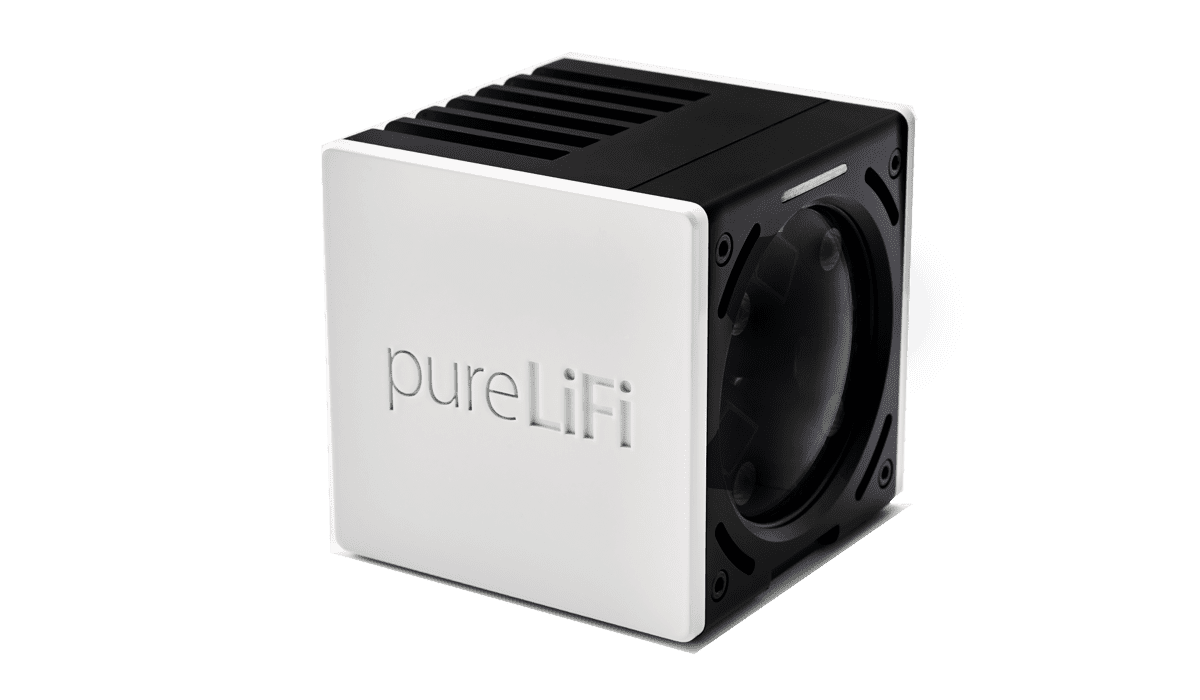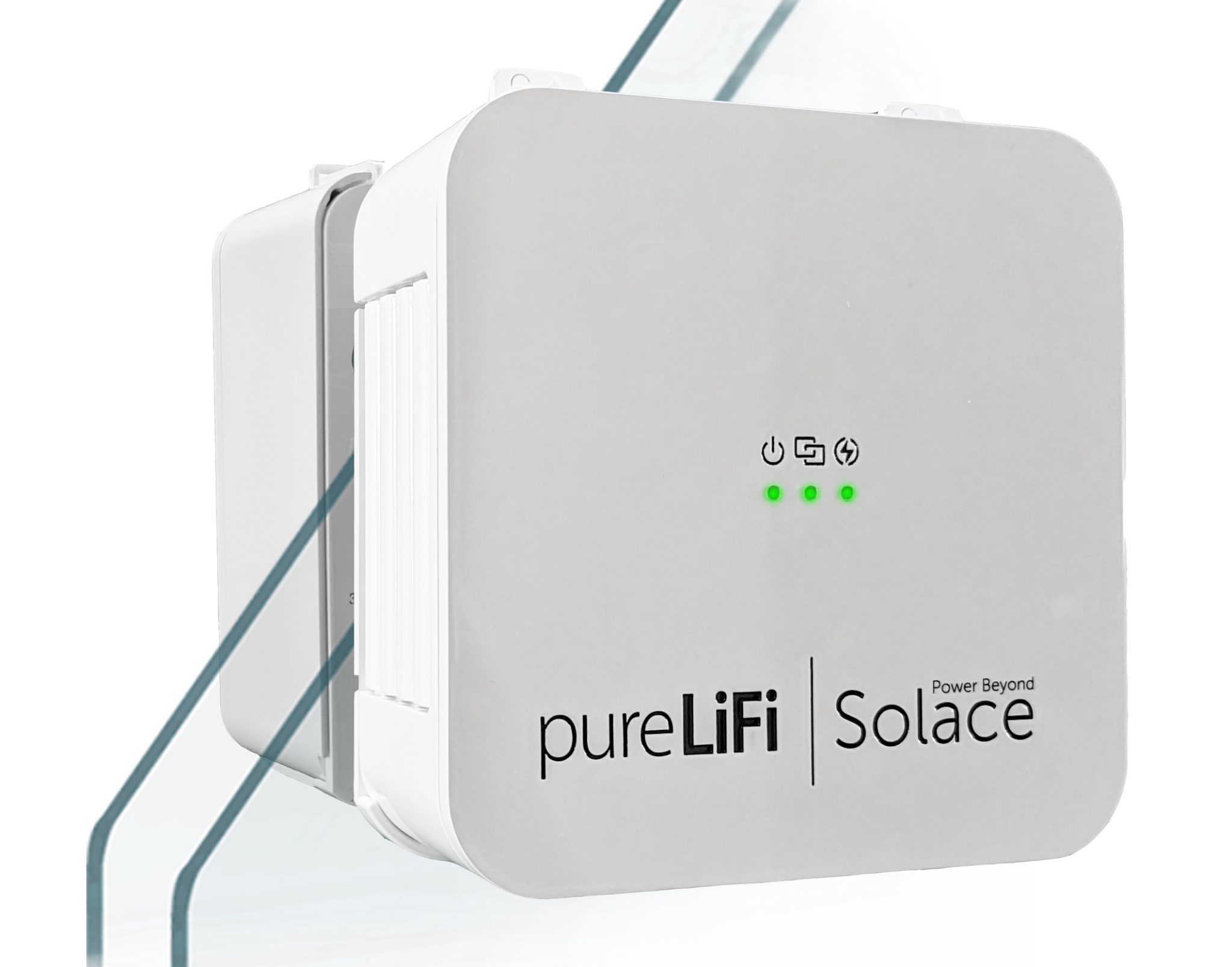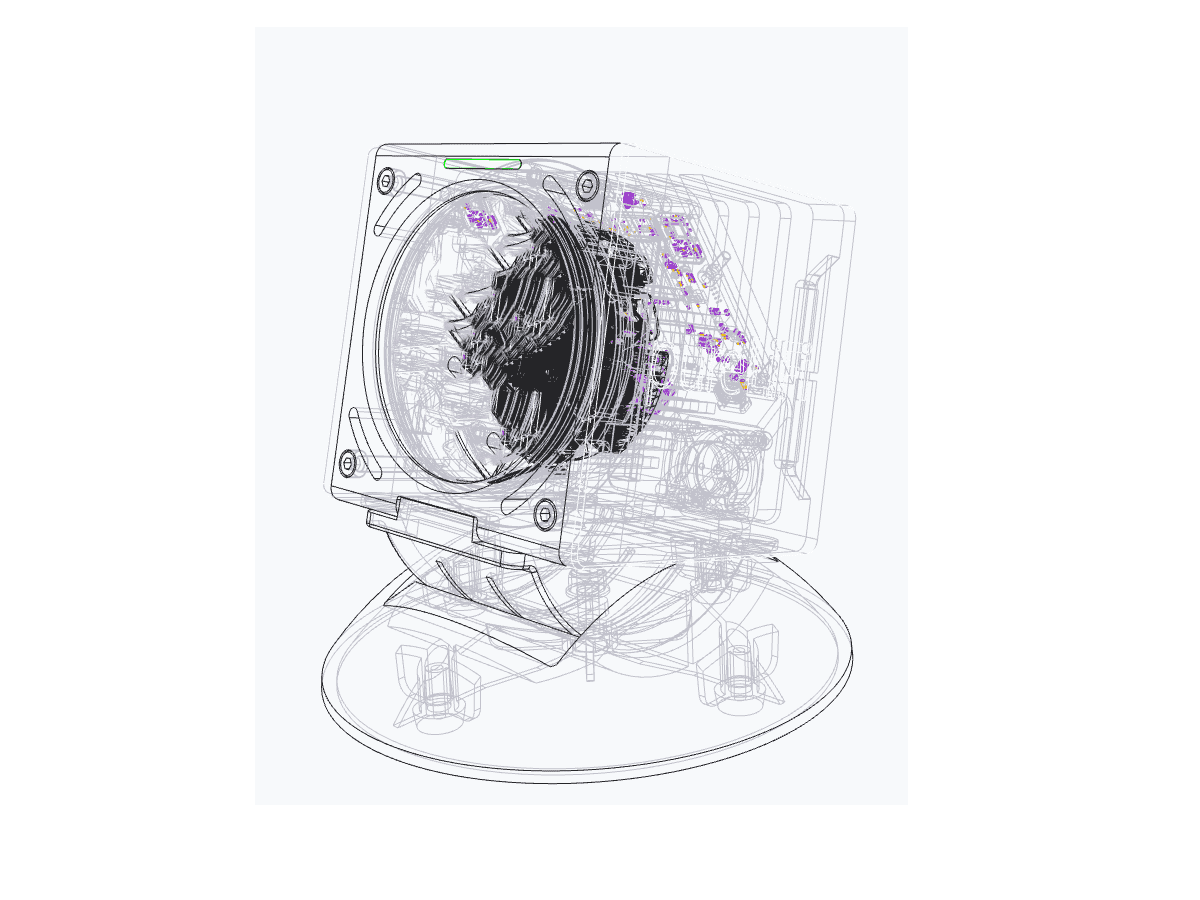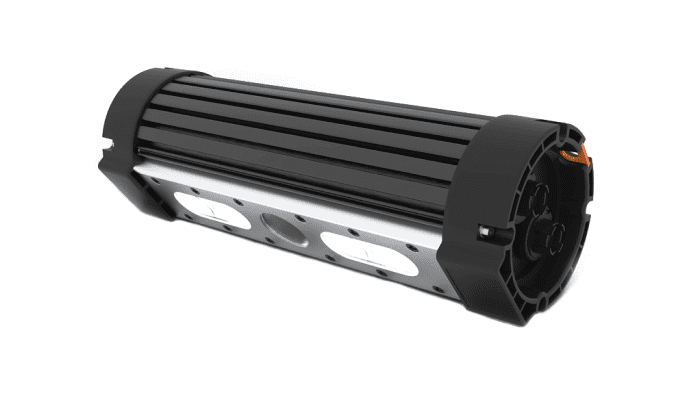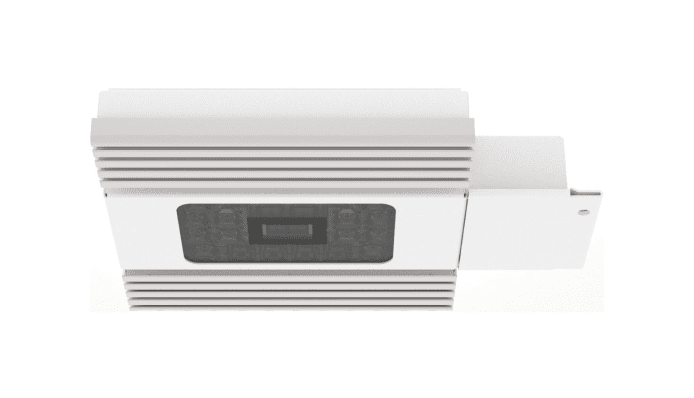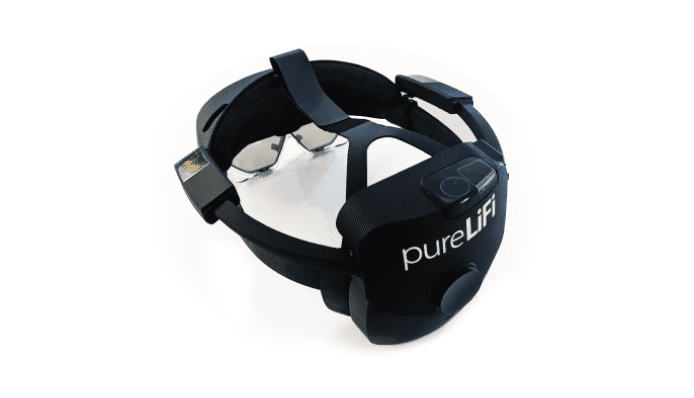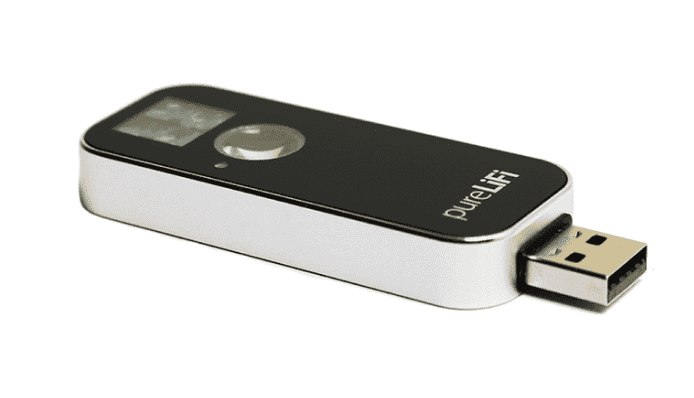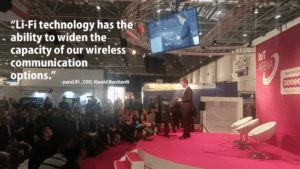
Making its debut at LuxLive last week, a live audience was witness to video content played via a LiFi internet connection, in the first ever demonstration at LuxLive of its kind. The experiment was carried out by Dr Harald Burchardt, chief operating officer at pureLiFi, a Scottish company currently developing and delivering LiFi solutions.
The LiFi system was connected via USB to a tablet. When Harald stood directly beneath the Power over Ethernet adapted stage lights, a network was quickly detected.
Speaking to LuxReview, Harald notes:
“Li-Fi technology has the ability to widen the capacity of our wireless communication options.”
During his talk in the IoT Arena at LuxLive, Harald commented that he does not consider LiFi to be a replacement to Wi-Fi, but wished it instead to be viewed as a, ‘secure extension to already available layers of communication’.
Theoretically, LiFi is quicker than Wi-Fi, although currently this has only been proven in a lab setting. However, it does possess the scope to be even faster in the future.
The innovation is described by experts as a secure, electromagnetic, interference free solution, combining the security of a wired internet connection with the flexibility of Wi-Fi. This coupled with the potential for improved speed and encryption puts LiFi in good stead to be the next technology of choice.
Full article published on ce-pro.eu
Professor Harald Haas; International Solid State Lighting Alliance (ISA) Award
CSO of pureLiFi and Professor of Mobile Communications at the University of Edinburgh, Harald Haas receives the International Solid State Lighting Alliance (ISA) Award for Outstanding Achievement in Beijing, China this November. The award, presented at the 13th International Forum on Solid State Lighting, relates to Professor Haas’s contribution to diversify the applications of solid state lighting (SSL) technology. 2014 Nobel Prize for Physics winner and previous winner of the Outstanding Achievement, Professor Shuji Nakamura, presented Professor Haas with the award.
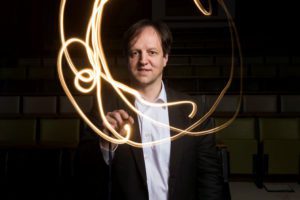
LiFi, which stands for ‘light fidelity’, is a technology that can transmit data through light and turn the lamps in every office, home, car or streetlight into wireless Internet access points. It offers higher speeds than traditional wireless technology, greater security and the potential to deliver unprecedented bandwidth and data density.
Professor Haas was recognised as the ‘father of LiFi’ after introducing the technology to the world at a TED Global talk in 2011, where he demonstrated light fidelity for the first time and coined the term LiFi. The company he founded in 2012, pureLiFi, is at the forefront of the commercialisation of LiFi technology and in 2016 launched the world’s first LiFi dongle – LiFi-X – and integrated LiFi luminaire.
Professor Haas established the world’s first LiFi centre in 2013, when the LiFi Research & Development Centre opened at the University of Edinburgh. The Centre now leads cutting-edge R&D, including pioneering work into the use of solar panels as receivers in a move which could help tackle Internet access problems in the developing world – the so-called ‘digital divide’.
Prof Haas speaks about the significance of this honour:
“It has been such a great honour to receive this prestigious award, which I would like to devote to everyone who supported me on this 14 year journey. LiFi is like an undiscovered beach full of pebble stones – under each stone there is something new and exciting to discover, and what is really thrilling is that these discoveries can change our lives and create massive commercial opportunities.”
Comments from the ISA jury included:
“…[Professor Haas] not only pioneered the novel concept of communication by lighting devices, but also publicized the technology earning him the recognition as the “father of LiFi”. The technique based upon SSL devices is penetrating the market of indoor ICT and certainly will have a great future in the era of Internet of Things. This is a considerable contribution to diversify the applications of SSL technology and open up new markets. His scientific-technical achievement certainly deserves to be awarded.”
pureLiFi CEO Alistair Banham, speaks about the recognition of LiFi technology and Haas’s work,
“ The honour Professor Harald Haas has received from this important organisation is a real indication of his contribution to science and technology as a whole. Harald is the global thought leader in LiFi and the path to innovation he has created for us will change the way the world connects in a high speed wireless future.”
Notes
- For information contact Sarah Scace, sarah.scace@purelifi.com

- Singapore government’s IMDA opens up spectrum for LiFi trials
- Singapore takes global lead in emerging LiFi technology
- Trials could enhance Singapore’s competitive advantage
pureLiFi, the Edinburgh based tech firm pioneering LiFi technology that will revolutionise the future of wireless networks, has been working closely with Singapore’s Info-communications Development Media Authority (IMDA) to trial its emerging technology in the sovereign city-state. pureLiFi has recently received investment from Singaporean investment firm Temasek.
LiFi, an abbreviation for Light Fidelity, is a technology that utilises light to transmit data wirelessly. LiFi can turn every light in your office, home, car or even streetlight into a wireless Internet access point. LiFi technology offers high data rates, greater security and offers a pathway to unlocking access to unprecedented bandwidth and data density.
Earlier this month Dr Yaacob Ibrahim, the Minister for Communications and Information, has announced the intention of the Info-Communications Media Development Authority (IMDA) to facilitate joint-industry Li-Fi trials in Singapore by removing some of the regulatory barriers. This marks a global first that has the potential to enhance Singapore’s competitiveness with the advent of 5G and the Internet of Things.
Harald Burchardt, pureLiFi COO describes why this step is visionary:
Singapore has demonstrated once again that the nation are global leaders in the adoption of innovative technologies. The vision to offer their country state-of-the-art wireless communications systems is reinforced by their action to quickly enable strong industry partnerships and an environment conducive to future commercial exploitation. We certainly hope other countries and regions will follow suit in embracing LiFi technology and its transformative potential.
pureLiFi has released three iterations of their LiFi system since launching in 2012 including the LiFi-X which consists of the world’s first LiFi dongle, and is also available in the form of a LiFi-integrated luminaire resulting from pureLiFi’s partnership with French lighting manufacturer Lucibel.
Alistair Banham, pureLiFi CEO said:
“This step by IMDA could signal the start of new paradigm in the way the world overcomes the bandwidth crunch. LiFi is a technology that will create new markets and merge two huge Industries – Lighting and Communications. This will result not only in new far-reaching commercial opportunities but also enhance the way we live in this mobile and wireless world.”
The bandwidth crunch is fast approaching as the number of connected devices like mobile phones, and other smart devices are growing exponentially and predicted to be in excess of 50 billion by 2020. Additionally, each year the world utilises 50% more wireless data than the previous one, creating an unprecedented demand. LiFi offers a new enhanced layer of super-fast and secure wireless communications.
This step by IMDA could signal the start of new paradigm in the way the world overcomes the bandwidth crunch.
Dr Yaacob Ibrahim spoke about what this could mean for Singapore:
“Li-Fi…has the potential to complement existing wireless networks to cater to society’s growing demand for higher internet connection speeds”
The announcement of this support for LiFi signals that Singapore has positioned themselves as a world leader in the race to unleash the powerful wireless networks that will realise our mobile and wirelessly connected future.
Posted on Geektime.com
With thriving startup scenes in Edinburgh and Glasgow, there’s good reason to look beyond London and the Silicon Roundabout. Hoping to follow in the footsteps of Scottish unicorns Skyscanner and FanDuel, we run down 10 Scottish startups doing exciting things.
READ MORE
